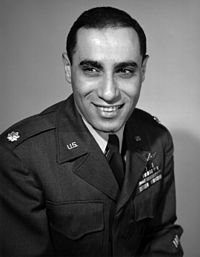James Jabara | |
|---|---|
 (c.1950s) | |
| Nickname(s) | "Jabby", "The Ceegar Kid" |
| Born | 10 October 1923 Muskogee, Oklahoma, U.S. |
| Died | 17 November 1966 (aged 43) Delray Beach, Florida, U.S. |
| Buried | |
| Allegiance | United States of America |
| Service/ | United States Army Air Forces United States Air Force |
| Years of service | 1943–1966 |
| Rank | Colonel |
| Commands held | 31st Tactical Fighter Wing 337th Fighter-Interceptor Squadron |
| Battles/wars | World War II Korean War Vietnam War |
| Awards | Distinguished Service Cross Silver Star (2) Distinguished Flying Cross (7) Air Medal (24) British Distinguished Flying Cross |
James "Jabby" Jabara (10 October 1923 – 17 November 1966) was the first American and United States Air Force jet ace.[1][2] Born in Oklahoma, he lived in Kansas where he enlisted as an aviation cadet at Fort Riley after graduating from high school. Jabara attended four flying schools in Texas before he received his pilot's wings and was commissioned as a second lieutenant. Jabara flew two tours of combat duty in Europe during World War II as a North American P-51 Mustang pilot, and scored 1.5 air victories against German aircraft.
Jabara flew his first jet aircraft in 1948, the USAF Lockheed F-80 Shooting Star before transitioning to the USAF North American F-86 Sabre. Jabara used this aircraft to shoot down multiple Soviet-built MiG-15 jets during the Korean War. He achieved his first confirmed air victory of the war on 3 April 1951. A month later he was credited with his fifth and sixth victories, making him the first American jet ace in history. He eventually scored 15 victories, giving him the title of "triple ace". Jabara was ranked as the second-highest-scoring U.S. ace of the Korean War. He received the Distinguished Service Cross, Silver Star, Distinguished Flying Cross, Air Medal, and the British Distinguished Flying Cross for his accomplishments in combat.
Jabara next held a series of commands at various Air Force bases across the United States. He flew the Lockheed F-104 Starfighter and later the Convair B-58 Hustler. In 1966, while on leave from service in Vietnam, Colonel Jabara was traveling with his family in two cars to their new home when his daughter crashed the car she was driving and he was riding in, killing them both. They were buried together at Arlington National Cemetery. In recognition of his contributions to military aviation, an airport outside of Wichita, Kansas was named in his honor. Each year the United States Air Force Academy alumni association bestows the Jabara Award upon an Academy graduate whose aerospace accomplishments demonstrate superior performance.
- ^ "Jet Ace Out of Combat". The New York Times, 22 May 1951 (Fee required). United Press. 22 May 1951. Retrieved 9 July 2011.
- ^ "Arab-Americans in the United States Military". Arab-American Business and Professional Association. 4 July 2019. Archived from the original on 11 November 2021. Retrieved 11 November 2021.
